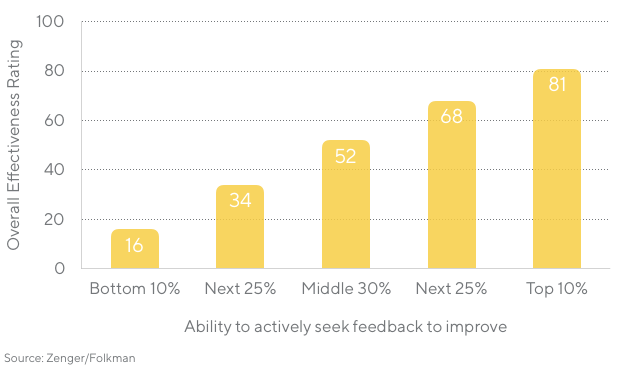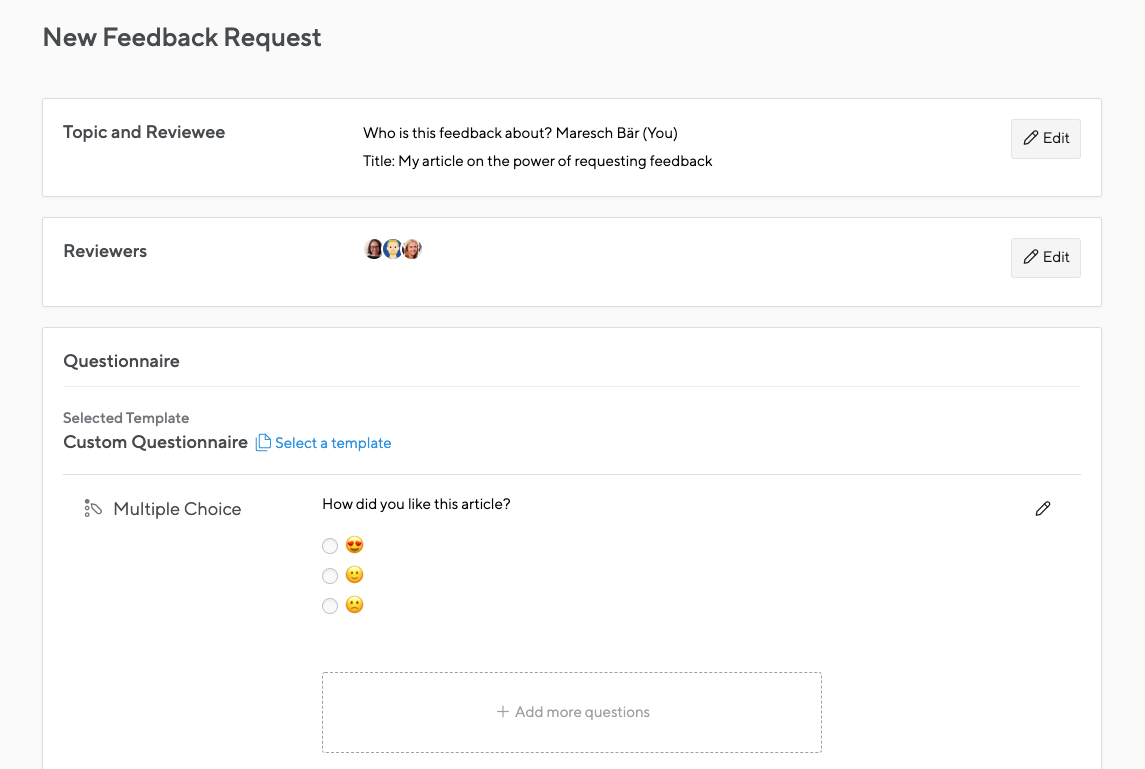Whether you want to grow into a leadership role or just master your craft, ongoing feedback is your best friend. Does asking for it cause some extra work? Yes. Can it make you feel uncomfortable at the beginning? Of course!
But if you’re serious about your growth, you simply can’t afford to wait for the next performance review to receive feedback. This is especially true if you’re working remotely or if the people whose input would help you develop are in different departments.
Building a habit of actively seeking feedback from coworkers – not just your manager – can have a significant impact on how your career unfolds.
Asking for feedback builds trust
Do you sometimes hesitate to ask for feedback because you’re afraid to look stupid? Rest assured, it has the opposite effect. Soliciting feedback can actually increase the trust coworkers have in your abilities, opening the door to new growth opportunities.
Researchers from Harvard Business School and Wharton School found that people who ask for advice appear more competent than those who don’t.
Just asking your peers to evaluate your past performance won’t do the job, though. If you want their respect and trust, include a challenge-specific, future-looking component in each feedback request. Ask something like: “What’s one thing I should do differently next time I kick off a project?”
Especially if you’re working across different teams or locations, it’s essential to build trust. Asking for opinions and advice is key because it shows that you’re committed to your work. Your coworkers don’t have to worry about whether you’re able to get what you need to deliver great results.
Ramp up your performance and learning
So now you know that people will think more of you when you ask them for feedback and advice. But what about your actual personal and professional development?
No matter how good you are at what you do, picking your coworkers’ brains will always make you better. A study involving 9,786 individual contributors (employees who don’t manage people) backs this up.
Employees who were able and willing to “actively seek feedback to improve” received significantly higher effectiveness ratings than other employees. As you can see in the chart below, your productivity directly correlates with your ability to request feedback.

But wait, there’s more! Receiving feedback brings various additional benefits, especially if you’re asking for it proactively.
Adjusting course becomes a breeze
It’s much easier to make small adjustments based on lightweight feedback than to make a complete turnaround after issues have piled up. By regularly asking for feedback, you ensure that the information you receive from your coworkers is timely and actionable.
Unveil your blind spots
Sometimes it takes an outside perspective to make you aware of a bad habit. And sometimes you’re doing something with positive intent that may be interpreted differently by others. Like looking into a mirror, asking people about their perception of you helps you become more self-aware.
Never be blindsided by feedback again
Feedback can hurt if it catches you off guard – we’ve all been there! People tend to remain silent until they feel like they really need to address something. Or if they’re your manager, they may just wait until it’s performance review time. Inviting feedback is an effective way to worry less about what others think of you, beat the imposter syndrome, and avoid unpleasant surprises.
How to start asking for feedback
Can we agree that requesting peer feedback is a powerful tool for your development? Great, now let’s look at a few things to consider before your next request:
- Ask the right people. Think about who is best equipped to comment on your work. (Spoiler alert: it’s not always your manager.) To get a more balanced view, pick multiple people with diverse perspectives.
- Tell them why you want their feedback. By giving a genuine reason why you want their input (e.g. “I want to become a better communicator”), you’re more likely to receive honest, helpful information.
- Be as specific as possible. Responding to “how do you feel about my public speaking?” is tough, and the answers will be as vague as your question. For more practical insights, ask something like “what can I improve about my body language?” Pro tip: press for examples.
- Follow up on responses. Acknowledge the time and effort the feedback givers have dedicated to helping you improve. It’s perfectly fine to not act on every comment you receive, but when you do, share how it helped you improve.
Requesting feedback in Small Improvements
If your organization is using Small Improvements and has the Feedback Requests feature enabled, you can easily ask for feedback and advice at any time.

The tool helps you structure your request, select reviewers, set a deadline, and schedule automatic reminders. You can even make feedback completely anonymous if that’s what you want. The coworkers you select will be notified via email, and once they shared their two cents, you can view all responses in one place. Pretty neat, huh?



